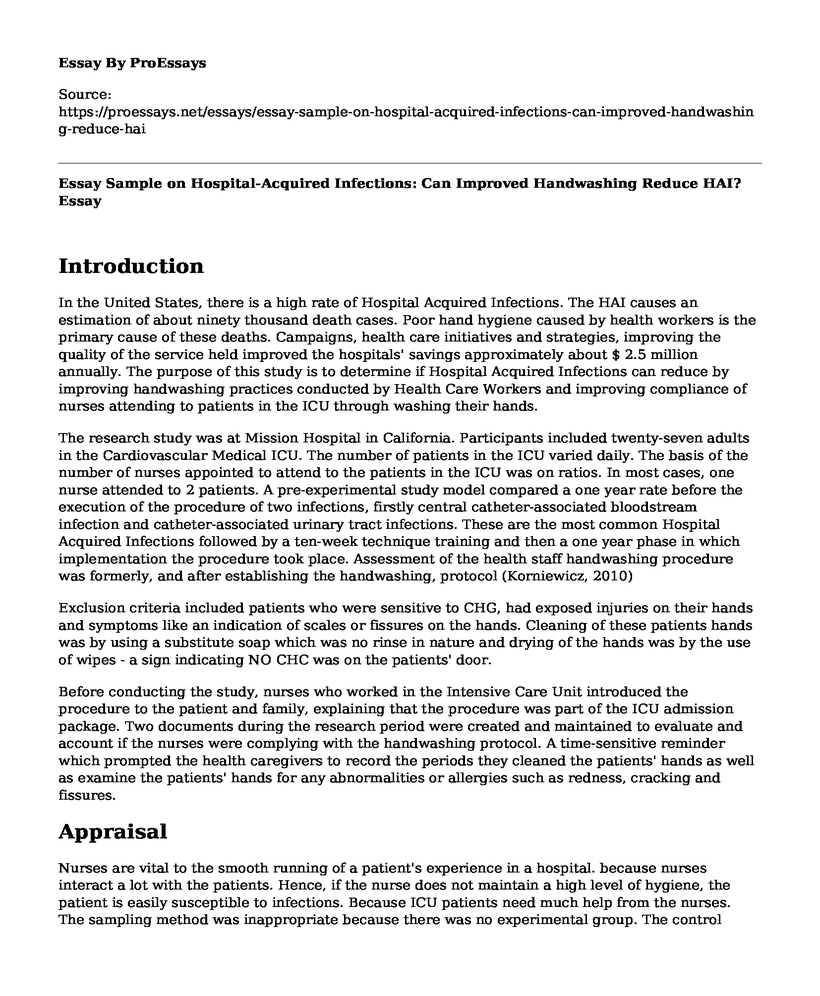Introduction
In the United States, there is a high rate of Hospital Acquired Infections. The HAI causes an estimation of about ninety thousand death cases. Poor hand hygiene caused by health workers is the primary cause of these deaths. Campaigns, health care initiatives and strategies, improving the quality of the service held improved the hospitals' savings approximately about $ 2.5 million annually. The purpose of this study is to determine if Hospital Acquired Infections can reduce by improving handwashing practices conducted by Health Care Workers and improving compliance of nurses attending to patients in the ICU through washing their hands.
The research study was at Mission Hospital in California. Participants included twenty-seven adults in the Cardiovascular Medical ICU. The number of patients in the ICU varied daily. The basis of the number of nurses appointed to attend to the patients in the ICU was on ratios. In most cases, one nurse attended to 2 patients. A pre-experimental study model compared a one year rate before the execution of the procedure of two infections, firstly central catheter-associated bloodstream infection and catheter-associated urinary tract infections. These are the most common Hospital Acquired Infections followed by a ten-week technique training and then a one year phase in which implementation the procedure took place. Assessment of the health staff handwashing procedure was formerly, and after establishing the handwashing, protocol (Korniewicz, 2010)
Exclusion criteria included patients who were sensitive to CHG, had exposed injuries on their hands and symptoms like an indication of scales or fissures on the hands. Cleaning of these patients hands was by using a substitute soap which was no rinse in nature and drying of the hands was by the use of wipes - a sign indicating NO CHC was on the patients' door.
Before conducting the study, nurses who worked in the Intensive Care Unit introduced the procedure to the patient and family, explaining that the procedure was part of the ICU admission package. Two documents during the research period were created and maintained to evaluate and account if the nurses were complying with the handwashing protocol. A time-sensitive reminder which prompted the health caregivers to record the periods they cleaned the patients' hands as well as examine the patients' hands for any abnormalities or allergies such as redness, cracking and fissures.
Appraisal
Nurses are vital to the smooth running of a patient's experience in a hospital. because nurses interact a lot with the patients. Hence, if the nurse does not maintain a high level of hygiene, the patient is easily susceptible to infections. Because ICU patients need much help from the nurses. The sampling method was inappropriate because there was no experimental group. The control group, which included patients in ICU, did not give accurate results because the experiment was one-sided.
Due to the experimental nature of the research, the handwashing of the nurse's and patients hands was consistent. The health caregivers cleaned their hands prior, and after they entered the patient's rooms while cleaning of the patient's hands was three times a day. The nurses also have an electronic reminder which was time-sensitive, and it reminded the nurses to document the three periods they washed the patient's hands and check if the patients were being affected by the CHG (Warye & Granato,2009).
The conclusions of the study were in support with the results which were documented by the nurses. The rate of Hospital Acquired Infections decreased while the nurse's handwashing compliance steadily upgraded from 48% to 75%. Explanation of the limits of this research was successful. One of the limitations was because the study was done in ICU of one hospital for a duration of 1-year generalization of the results would not be done to other institutions.
Conclusion
Observing hygiene in hospitals by health care workers such as nurses encourage a safe and conducive environment to patients. Therefore, nurses should wash their hands before and after exiting a patients room to prevent Hospital Acquired Infections.
References
Korniewicz DM, El-Masri M. Exploring the factors associated with hand hygiene compliance of nurses during routine clinical practice. Appl Nurs Res. 2010;23:86-90.
Warye K, Granato J. Target: zero hospital-acquired infections. Healthc Financ Manage. 2009;63(1):86-91.
Cite this page
Essay Sample on Hospital-Acquired Infections: Can Improved Handwashing Reduce HAI?. (2023, Mar 30). Retrieved from https://proessays.net/essays/essay-sample-on-hospital-acquired-infections-can-improved-handwashing-reduce-hai
If you are the original author of this essay and no longer wish to have it published on the ProEssays website, please click below to request its removal:
- Essay Sample on Aboriginal Health and Cultural Safety
- Critical Analysis of Health Disparities by Race and Class: Why Both Matter
- Healthcare Operation Management: Essay Sample
- Paper Example on Paleo Diet Plan: 4 Meals on 1885 Calories/Day
- Paper Example on Granny's Got Game: Uplifting Old-Age Tales of Basketball Teams
- Essay Example on FDA Takes Action to Safeguard Public Health from Radiation Emitting Products
- Comprehensive Elderly Assessment: Essential for Health Risks - Free Paper Example







